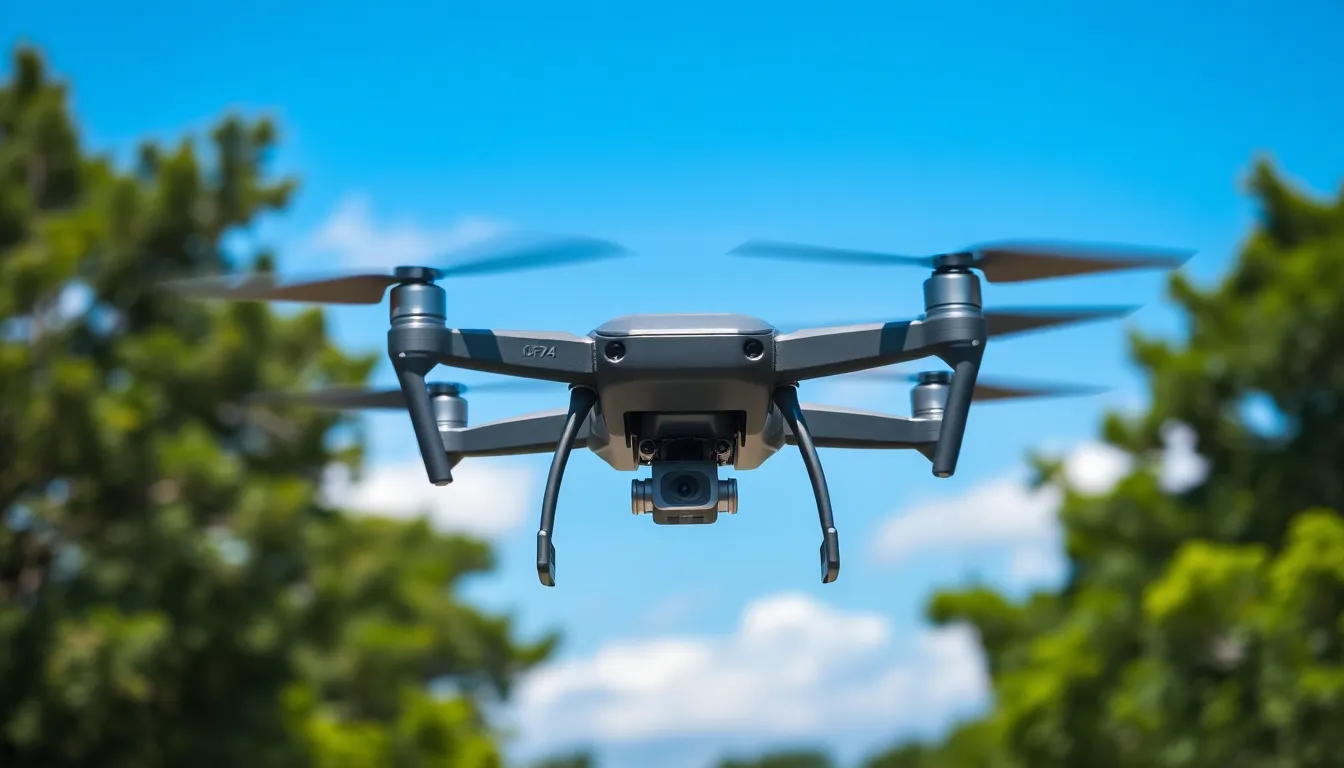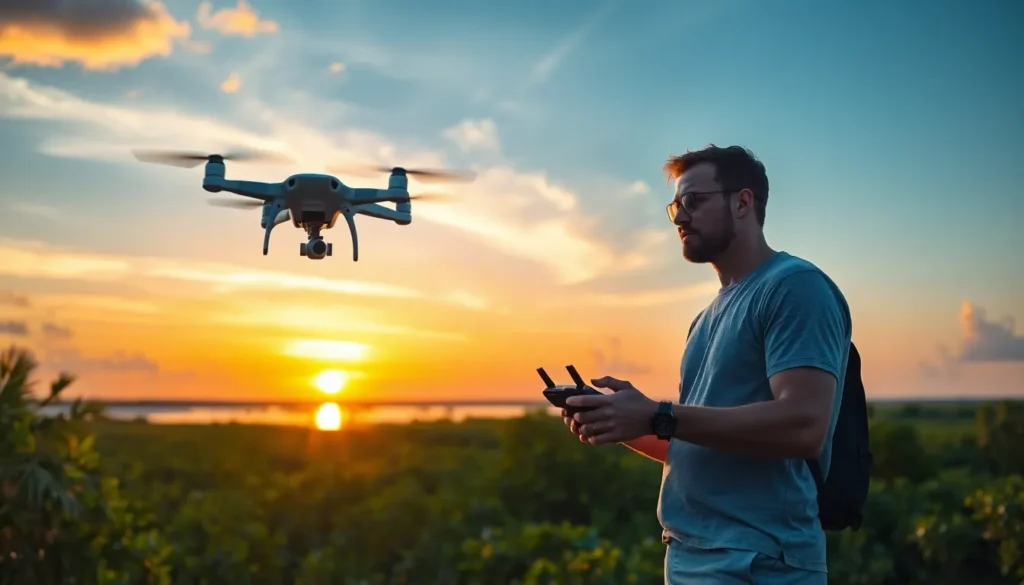Florida’s skies are buzzing with more than just sunshine and seagulls—drones are taking over! These high-flying gadgets are transforming everything from photography to agriculture, making life easier and a whole lot more exciting. Picture this: a drone capturing breathtaking views of the Everglades while you sip a piña colada on the beach. Sounds like a dream, right?
Table of Contents
ToggleOverview of Florida Drones
Drones in Florida serve various purposes across multiple industries. They provide unique advantages in sectors such as photography, agriculture, inspection, and emergency response. With stunning landscapes, including the Everglades and coastal areas, drone photography captures breathtaking imagery that attracts both hobbyists and professionals.
Agricultural applications highlight how drones monitor crop health, manage irrigation, and increase yield. Farmers rely on aerial data to efficiently assess field conditions, making informed decisions that boost productivity.
Inspection tasks benefit greatly from drone technology, especially in infrastructure maintenance. Drones can safely inspect bridges, power lines, and roofs, reducing risk for workers. Quick assessments lead to timely repairs, saving time and resources.
In emergency response scenarios, drones play a crucial role. They assist in search and rescue efforts by offering aerial views of disaster-stricken areas. Drones can also deliver medical supplies to remote locations quickly.
Florida’s relaxed regulations and diverse landscapes bolster the growth of the drone industry. Numerous companies and start-ups focus on drone services, creating jobs and driving innovation. The state attracts enthusiasts for recreational flying, commercial applications, and technological advancements.
Research shows that Florida ranks among the top states for drone usage due to its favorable climate and terrain. The integration of drones into everyday life continues to evolve, shaping the way residents and industries operate. Enhanced experiences and increased efficiency outline the transformative impact of drones in the Sunshine State.
Regulations Governing Florida Drones

Drones in Florida are subject to both federal and state regulations that ensure safe operation. Understanding these regulations is crucial for recreational and commercial users.
Federal Regulations
The Federal Aviation Administration (FAA) oversees drone operations nationwide. Drones must be registered if they weigh more than 0.55 pounds. Pilots need to follow guidelines in Part 107 of the FAA regulations for commercial use, which include passing a knowledge test and maintaining a remote pilot certificate. Along with these requirements, pilots cannot fly drones above 400 feet or in controlled airspace without authorization. Night flying requires additional lighting on drones, as specified by the FAA. Adherence to these regulations ensures compliance with national safety standards.
State Regulations
Florida state regulations complement federal rules, focusing on local usage. Operators must respect privacy laws, avoiding flights over private property without permission. Specific rules apply to drone use near critical infrastructure, such as power plants and correctional facilities. The state prohibits flying drones over certain protected areas, like state parks and wildlife refuges. Florida also permits local governments to establish additional drone regulations, which may vary by city or county. Familiarity with these state policies helps ensure responsible drone operation throughout Florida.
Popular Uses of Drones in Florida
Drones play an essential role in a variety of fields across Florida. Their versatility allows industries to leverage advanced technology for improved efficiency and creativity.
Real Estate and Aerial Photography
Aerial photography has transformed real estate marketing in Florida. Drones capture stunning images and videos that showcase properties from unique perspectives. These visuals attract potential buyers by providing detailed views of homes and surrounding landscapes. Agents benefit from using drones to highlight desirable neighborhoods and amenities, enhancing property listings. Often, aerial shots help distinguish properties in competitive markets. High-quality imagery significantly boosts engagement and sales potential, demonstrating the power of drone technology in real estate.
Agriculture and Crop Monitoring
Agriculture in Florida embraces drone technology for crop monitoring and management. Farmers utilize drones equipped with sensors to gather data on crop health and irrigation needs. This technology enables precise analysis of fields, facilitating timely decisions to optimize yields. Many farmers use drones to identify pest infestations and nutrient deficiencies, addressing issues before they escalate. Additionally, aerial imagery supports efficient planning and resource allocation. With the ability to cover vast areas quickly, drones contribute to sustainable agricultural practices, enhancing productivity across the state.
Best Practices for Drone Operation in Florida
Operating drones in Florida requires adherence to best practices that ensure safety and respect for the environment. Knowledge of local regulations and mindful operation fosters a positive experience for all.
Safety Guidelines
Safety is paramount in drone operation. Pilots must always maintain line of sight with their drones, avoiding obstacles and air traffic. Complying with altitude restrictions set by the FAA is crucial. Regular maintenance checks help ensure drones function properly. Moreover, utilizing safety equipment, such as propeller guards, can prevent accidents. Awareness of no-fly zones, including areas near airports and military bases, prevents legal violations. A thorough pre-flight checklist will further enhance safety measures. Following these guidelines reduces the risks associated with drone flying and promotes responsible usage.
Environmental Considerations
Environmental impact plays an important role in drone operation. Respect for wildlife is essential when flying drones, especially over sensitive habitats like wetlands or parks. Minimizing noise disturbances helps protect local fauna and enhances the experience of other visitors. Adhering to guidelines regarding proximity to wildlife promotes conservation efforts. Utilizing eco-friendly drones helps reduce carbon footprints and aligns with sustainability goals. Pilots must avoid flying near nesting sites or during sensitive periods for breeding or migration. Consideration of these factors leads to responsible drone use and protects Florida’s diverse ecosystems.
Challenges Facing Florida Drone Users
Florida drone users encounter specific challenges that can impact their operations. Understanding these difficulties is essential for effective drone management.
Weather Conditions
Variable weather conditions affect drone performance. High winds, frequent thunderstorms, and humidity pose significant risks. Pilots must consider local forecasts before flying. Inclement weather not only disrupts scheduling but can damage equipment. Safe operation requires adaptability to these meteorological changes.
Legal Issues
Complex legal issues complicate drone usage in Florida. Operators must navigate both federal and state regulations. The Federal Aviation Administration (FAA) sets strict guidelines regarding registration and flight operations. State laws emphasize privacy and require awareness of local restrictions. Non-compliance can lead to substantial penalties. Drone users benefit from staying informed about evolving regulations to ensure they operate within the law.
Florida’s drone landscape continues to flourish as technology advances and regulations adapt. The versatility of drones in various sectors showcases their potential to enhance productivity and safety. From breathtaking aerial photography to efficient agricultural practices and emergency response, drones are reshaping how industries operate in the Sunshine State.
As drone enthusiasts and professionals navigate the regulatory framework, they play a vital role in ensuring safe and responsible usage. With a commitment to best practices and environmental stewardship, Florida’s drone operators are not only contributing to their fields but also preserving the beauty of the state’s diverse ecosystems. The future of drones in Florida promises exciting developments that will further transform everyday life and industry standards.

